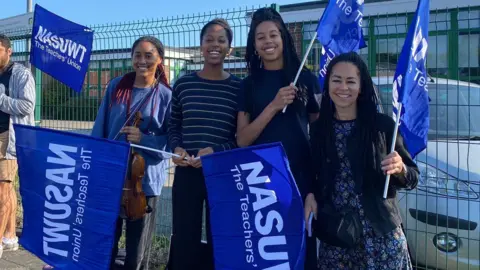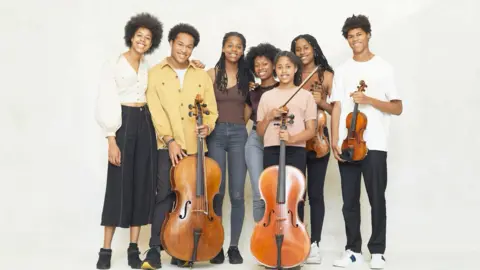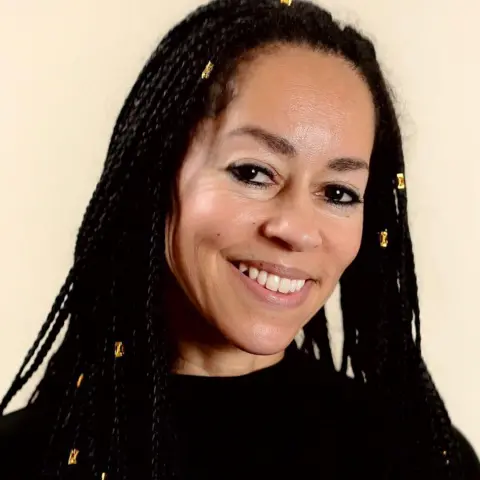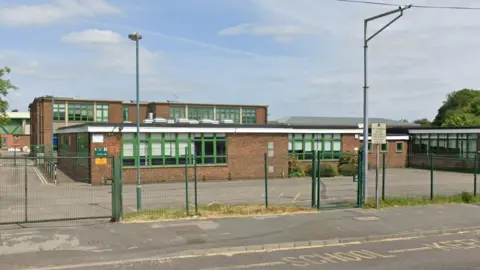
 Stewart Halforty/NASUWT
Stewart Halforty/NASUWTA mother from a world-famous family of classical musicians has joined striking teachers at the school where her children were educated.
All seven of Dr Kadiatu Kanneh-Mason’s children attended The Trinity Catholic School in Aspley, Nottingham, where action is scheduled for Wednesday and Thursday in a dispute over staffing levels.
She said the number of music teaching hours pupils received would be reduced under new proposals being put forward.
The trust that runs the school said it would continue to “prioritise the arts” in its curriculum.
 Jack Turney
Jack TurneyThe Kanneh-Mason family first shot to fame when six of them reached the Britain’s Got Talent semi-final in 2015.
Sheku, the third eldest, later played at Prince Harry and Meghan Markle’s wedding and became the first black artist to win BBC Young Musician of the Year.
Ten members of teaching staff at their former school are set to leave at the end of this year and will not be replaced, according to the National Education Union (NEU).
The union told the BBC that music hours being taught would be cut from its current level of two hours per week to 90 minutes.
 Supplied
SuppliedDr Kadiatu Kanneh-Mason, who joined teachers at the picket line on Wednesday with three of her daughters, said she felt like music education was being “stripped away” at the school.
“If my children hadn’t gone [to Trinity] they would not have been musicians now, but more than that they wouldn’t have been the people they are now,” she said.
“A lot of the music teachers have been told they’ve got to teach other subjects which they don’t specialise in because there are not going to be enough hours of music left in the school.
“I want to stand with striking staff because my children have had a long association with Trinity school.
“The whole ethos of the school is being stripped away and morale is really low.”
School head Matt Shenton said: “We prioritise the arts in the KS3 curriculum, dedicating 54% more time to music and orchestra compared to similar schools.
“Our year seven, eight and nine students will still receive 1.5 hours per week of music and orchestra on average.
“The orchestra, where all year seven and eight students learn to read music, play instruments, and participate in a large ensemble will receive one hour per week in year seven, reducing to 30 minutes in year eight.
“The adjustments, made to address funding deficits and curriculum demands, are managed with the best interests of students in mind. The school will continue to maintain class sizes below national averages.”
The NEU said the proposals being made by the trust could have a “longer lasting detrimental impact” on pupils.
 Google
GoogleDr Kanneh-Mason added: “Music gives children a sense of identity, a sense of belonging and a sense of creative outlet. If we strip that away from a school, the school changes completely.
“I went to see the head teacher who told me that a lot of the reason they’re taking away the music is because they want to teach more history and geography.
“I think if you say that other subjects are worth more than music then that’s a problem for me – I don’t think music is worth more than any other subject, but I don’t think we should be getting rid of music to make cuts in other areas.”
Following the announcement of the strike by the union, the trust said it had been experiencing “significant financial pressures” due to “chronic underfunding of schools”.
According to the NEU, additional support staff will be recruited at the school, but officials said classroom teachers were needed for the “outcomes for young people to be maintained”.
Joint secretary Sheena Wheatley said there were concerns about how much the school’s orchestra would continue to “thrive”.
She told the BBC: “We’re also concerned that the specialism of music which is very much associated of Trinity and is part of its identity will decline over time now that wedge is driven in.
“Our concern is that if you keep cutting what should really be every child’s right to learn music – if you take those things away – that you’re not serving the community as you did.”
Follow BBC Nottingham on Facebook, on X, or on Instagram. Send your story ideas to eastmidsnews@bbc.co.uk or via WhatsApp on 0808 100 2210.



Be the first to comment